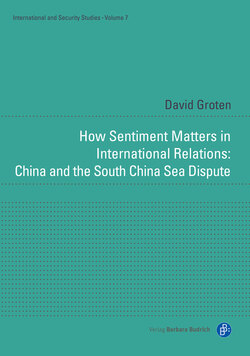How Sentiment Matters in International Relations: China and the South China Sea Dispute

Реклама. ООО «ЛитРес», ИНН: 7719571260.
Оглавление
David Groten. How Sentiment Matters in International Relations: China and the South China Sea Dispute
Table of Contents
List of Tables
List of Figures
List of Abbreviations1
[13] Introduction
[20] 1. Research Interest and Relevance
[23] 2. Analytical and Theoretical Framework
2.1 A Conceptualization of Respect
2.1.1 Respect: Definitions, Related Concepts and Implications
2.1.1.1 Related Concepts and Terms
2.1.1.2 Respect: Applicability Beyond the Individual Level
[32] 2.1.1.3 Cognitive Effects of Disrespect
2.1.1.4 Possible Political Implications of Respect and Disrespect
2.1.2 Face (Work) and its General Role in China
2.2 The Hypotheses
2.2.1 Hypothesis I: ‘China’s self-ascribed status and identity conceptions were subject to change between 2007 and 2016’
2.2.2 Hypothesis II: ‘Chinese50 disrespect experiences in the context of the SCS dispute are severe and have been increasing over time’51
2.2.3 Hypothesis III: ‘A causal correlation between (dis)respect experiences and the type of policy recommendations and preferences advocated by FPTT scholars is plausible’
2.2.4 The Hypotheses: Summary
2.3 Operationalization of Respect and Disrespect
[51] 2.3.1 Reference Points and Respect Indicators
2.3.2 Literal Usage
[53] 2.3.3 References to Status and Social Importance
2.3.4 References to Rights
2.3.5 References to Dominant National Identity Narratives
2.3.6 Emotional Critique
[57] 2.3.7 Reliance on Minor Issues
[58] 2.4 Think Tanks as Research Subjects
[60] 2.4.1 Chinese FPTTs: Characteristics
2.5 Summary Analytical and Theoretical Chapter
[64] 3. The South China Sea Dispute
[65] 3.1 Historical Background and Sources of Conflict
[74] 3.2 Official Position and Claims by the PRC
[80] 3.3 Official Position and Claims by the Philippines
3.4 Official Position by the U.S
3.5 Official Position by the ASEAN
[87] 4. The Role of (Dis)Respect in FPTT Discourses on External Stakeholders’ SCS Conduct
[89] 4.1 Hypothesis I: ‘China’s self-ascribed status and identity conceptions were subject to change between 2007 and 2016’
[91] 4.1.1 Identity Conceptions
4.1.2 Shift in Identity Conceptions
4.1.3 Status Conceptions
4.1.4 Shift in Status Conceptions
4.1.5 Summary Hypothesis I
[113] 4.2 Hypothesis II: ‘Chinese disrespect experiences in the context of the SCS dispute are severe and have been increasing over time’ (sub-case I: perception of U.S. conduct)
4.2.1 General Perception of Sino-U.S. Relations
4.2.2 General Perception of the U.S. Role in Southeast Asia
[118] 4.2.3 General Assessment of the ‘Return to Asia’
[120] 4.2.4 General Perception of U.S. Conduct in the South China Sea
4.2.5 Manifestations of (Dis)Respect in Discourses on U.S. Conduct (Criterion A1)
4.2.5.1 Literal Usage and Direct Reference
4.2.5.2 Status References
4.2.5.3 References to Rights
4.2.5.4 References to National Identity Narratives
4.2.5.5 Emotional Critique
4.2.5.6 Reliance on Minor Issues
4.2.6 Summary Hypothesis II: Sub-Case I
[163] 4.3 Hypothesis II: ‘Chinese disrespect experiences in the context of the SCS dispute are severe and have been increasing over time’ (sub-case II: perception of Philippine conduct)
[164] 4.3.1 U.S.-Philippine Relations
4.3.2 Sino-Philippine Relations
[177] 4.3.3 Outlook: Sino-Philippine Relations under Duterte
[179] 4.3.4 Manifestations of (Dis)Respect in Discourses on Philippine Conduct (Criterion A2)
4.3.4.1 Literal Usage and Direct Reference
4.3.4.2 Status References
4.3.4.3 References to Rights
[211] 4.3.4.4 References to National Identity Narratives
[216] 4.3.4.5 Emotional Critique
4.3.4.6 Summary Hypothesis II (Sub-Case II)
4.4 Hypothesis III: ‘A causal correlation between (dis)respect experiences and the type of policy recommendations/preferences advocated by FPTT scholars is plausible’
4.4.1 Main Objective I: Re-establishment of Respect & Self-worth
4.4.2 Main Objective II: Education of the Offender
[227] 4.4.3 Recommendations/Preferences in Response to External Conduct (Criterion C)
4.4.3.1 Recommendations/Preferences (2010–2012)
4.4.3.2 Recommendations/Preferences (mid-2012–2016)
4.4.4 Responsibility of the Offender (Criterion B)
4.4.4.1 Empathy and Self-Reflection
4.4.4.2 Summary: Recommendations, Preferences and Responsibility
4.4.5 Objectives of Retaliation278 (Criterion D)
4.4.5.1 Explanation I: Prevention of Exploitation/Misinterpretation to Maintain Self-conception
4.4.5.2 Explanation II: Re-establishment of Status and Prestige
4.4.5.3 Explanation III: Justice Restoration
4.4.5.4 Explanation IV: Revenge
4.4.5.5 Explanation V: Amelioration of Interest Protection
4.4.5.6 Summary: Explanations and Objectives
4.4.6 Plausibility of Causal Mechanism
4.4.7 Limitations
[293] 4.4.7.1 Deviation by Sub-Case/Cross-Case Comparison
4.4.7.2 Empirical (and Methodological) Generalizability
4.5 Summary of the Core Findings
[304] 5. Implications & Policy Recommendations
5.1 Theoretical Implications
5.2 Empirical Implications & Country-Specific Recommendations
5.2.1 Recommendations to the PRC
5.2.2 Recommendations to the Philippines
5.2.3 Recommendations to the United States
[323] 5.3 General Recommendations and Outlook (Quo Vadis SCS?)
[330] 6. Conclusion
[339] 7. Appendix. 7.1. The Category System
[342] 8. Bibliography. 8.1 Secondary Sources
8.2 Primary and Government Sources
8.3 Think Tank Sources
[376] Annotations
Отрывок из книги
[5] “In order to understand others’ behavior, and in order to behave in a manner such that we can influence others, we must try to understand the world as they do” (Craig, 2007, p. 1).
“[I]t is no wonder that postconflict peacebuilding efforts too frequently fail and wars reerupt because peace settlements and peacebuilding policies play with emotional fire that practitioners scarcely understand but nevertheless seek to manipulate“ (Crawford, 2000, p. 116).
.....
5.1 Theoretical Implications
5.2 Empirical Implications & Country-Specific Recommendations
.....